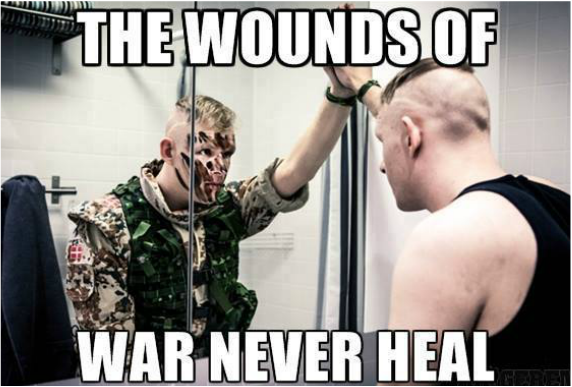|
WASHINGTON - After a four-year study commissioned by Congress, the Institute of Medicine in Washington, D.C., concluded that there are many programs addressing post-traumatic stress disorder, but no one can tell how effective they are.
"We found in the study that some programs do work, but quite a few service members don't like them and therefore don't go to them," said Elspeth Ritchie with Georgetown University and a former Army colonel. "We looked at established therapies, as well as what I call innovative therapies like yoga and acupuncture," she added. They also studied a procedure called stellate ganglion block where an anesthetic is injected into the neck. SGB has been used to block chronic pain receptors but it also has an impact on those with post-traumatic stress. While promising, "There is still much we don't know, that is one shot enough, two or repeated treatments but at what interval?" said Maryam Navaie with Advance Health Solutions, which conducted its own study on SGB. The Institute of Medicine study concluded that despite all the programs for post-traumatic stress disorder, the Department of Defense and Veterans Affairs have no mechanism to collect, analyze or disseminate data as to the quality of PTSD care. ___________________________________________________________________________________________________ Numbers don't lie, right now we are losing more than 22 veterans a day to suicide, we know at the Military Veteran Project lives can be saved. Research and treatments are being done across the nation at various medical facilities to learn more about the brain and researchers have uncovered new details about what happens in the brain when a mild source of stress generates an extreme response, disproportionate to the stress. Their findings identify possible targets for new alternative treatments and therapies to heal the debilitating stress responses that define post-traumatic stress disorder. People develop PTSD after experiencing severe trauma, which in turn makes them hypersensitive to stress even in situations completely unlike the original trauma. To register as a research candidate, CLICK HERE. Subscribe Get Social Participate Advocate
0 Comments
Many people with PTSD struggle in coping with flashbacks. Flashbacks are considered one of the re-experiencing symptoms of PTSD. In a flashback, a person may feel or act as though a traumatic event is happening again. A flashback may be temporary and some connection with the present moment may be maintained, or a person may lose all awareness of what is going on around him, being taken completely back to their traumatic event.
For example, a rape survivor, when triggered, may begin to smell certain scents or feel pain in her body similar to that which was experienced during her assault. People with PTSD may also experience dissociation. Dissociation is an experience where a person may feel disconnected from himself and/or his surroundings. Similar to flashbacks, dissociation may range from temporarily losing touch with things that are going on around you (kind of like what happens when you daydream) to having no memories for a prolonged period of time and/or feeling as though you are outside of your body. Both flashbacks and dissociation may occur as a result of encountering triggers, or a reminder of a traumatic event. To the extent that people are not aware of their triggers, flashbacks and dissociation can be incredibly disruptive and unpredictable events that are difficult to manage. However, you can take steps to better manage and prevent flashbacks and dissociation. These are described below. Know Your TriggersIn coping with flashbacks and dissociation, prevention is key. Flashbacks and dissociation are often triggered or cued by some kind of reminder of a traumatic event (for example, encountering certain people, going to specific places), or some other stressful experience. Therefore, it is important to identify the specific things that trigger flashbacks or dissociation. By knowing what your triggers are, you can either try to limit your exposure to those triggers, or if that is not possible (which is often the case), you can prepare for them by devising ways to cope with your reaction to those triggers. In addition to reducing flashbacks and dissociation, knowing your triggers may also help with other symptoms of PTSD, such as intrusive thoughts and memories of a traumatic event. Identify Early Warning Signs Flashbacks and dissociation may feel as though they come "out-of-the-blue." That is, they may feel unpredictable and uncontrollable. However, there are often some early signs that a person may be slipping into a flashback or a dissociative state. For example, a person's surroundings may begin to look "fuzzy," or someone may feel as though he is separating from or losing touch with his surroundings, other people, or even himself. Flashbacks and dissociation are easier to cope with and prevent if you can catch them early on. Therefore, it is important to try to increase your awareness of early symptoms of flashbacks and dissociation. Next time you experience a flashback or dissociation, revisit what you were feeling and thinking just before the flashback or dissociation occurred. Try to identify as many early symptoms as possible. The more early warning signs you can come up with, the better able you will be to prevent future flashbacks or episodes of dissociation. Learn Grounding Techniques As the name implies, grounding is a particular way of coping that is designed to "ground" you in the present moment. In doing so, you can retain your connection with the present moment and reduce the likelihood that you slip into a flashback or dissociation. In this way, grounding may be considered to be very similar to mindfulness. To ground, you want to use the five senses (sound, touch, smell, taste, and sight). To connect with the here and now, you want to do something that will bring all your attention to the present moment. A couple of grounding techniques are described below.
Seek TreatmentIn the end, the best way to prevent flashbacks and dissociation is to seek out treatment for your PTSD. Flashbacks and dissociation may be a sign that you are struggling to confront or cope with the traumatic event you experienced. Treatment can help with this. You can find PTSD treatment providers in your area through the Anxiety Disorder Association of America website, as well as UCompare HealthCare from About.com. TheInternational Society for the Study of Trauma and Dissociation (ISSTD) also provides a wealth of information on the connection between trauma and dissociation, how to cope with dissociation, and provides links to therapists who treat trauma and dissociation. Source: Linehan, M.M. (1993). Skills training manual for treating borderline personality disorder. New York: Guilford Press. |
Sign up for our mailing list by clicking here
Archives
March 2020
|
|
Get to know us
|
Resources
|
Get Involved
|
|
|
|
|
The Military Veteran Project is a non-profit 501 (c)3 organization, IRS identification number 46-0877378. Donations made to the Military Veteran Project are tax deductible in the U.S. ·



 RSS Feed
RSS Feed